

Diane Mary Cowan
Impacts & Adaptation. A Student's Guide to Global Climate Change. Island Institute. A Climate of Change Workshop | Ocean Acidification Island and coastal communities are on the front line of environmental changes associated with climate change and ocean acidification.

Across New England, fishermen and scientists are observing notable shifts in the ecosystem and dramatic changes in the number of fish in the water. Years of harvesting pressure paired with the effects of warming waters and an ever-changing ocean ecosystem have led to the crisis we currently face in the groundfish fishery. Other fisheries such as lobster and shrimp are also grappling with shifting environmental conditions. Scientists, managers, and fishermen have all begun to discuss how we can and should be planning for the unpredictable, impacts these shifts will have on the marine environment and the communities that depend on the ocean resources.
We do this by: A Climate of Change Workshop View the full Climate of Change Workshop Report Video Series Part 1: Warming Waters in the Gulf of Maine. ARKive - Discover the world's most endangered species. Wildscreen's Arkive project was launched in 2003 and grew to become the world's biggest encyclopaedia of life on Earth. With the help of over 7,000 of the world’s best wildlife filmmakers and photographers, conservationists and scientists, Arkive.org featured multi-media fact-files for more than 16,000 endangered species. Freely accessible to everyone, over half a million people every month, from over 200 countries, used Arkive to learn and discover the wonders of the natural world. Since 2013 Wildscreen was unable to raise sufficient funds from trusts, foundations, corporates and individual donors to support the year-round costs of keeping Arkive online. 21 Writing Prompts for Setting a Scene in Your Novel. When you’re writing (or rewriting) a scene, do you ever get the feeling you just don’t have enough to say?
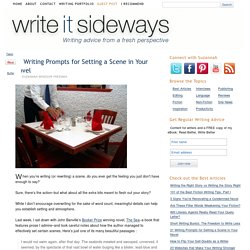
Sure, there’s the action–but what about all the extra bits meant to flesh out your story? While I don’t encourage overwriting for the sake of word count, meaningful details can help you establish setting and atmosphere. Last week, I sat down with John Banville’s Booker Prize winning novel, The Sea–a book that features prose I admire–and took careful notes about how the author managed to effectively set certain scenes. Here’s just one of its many beautiful passages : I would not swim again, after that day. From this passage, I know the narrator is remembering something unpleasant from his past, and the imagery foreshadows what happens later in the story.
10 Tips on Writing Strong Scenes For a Novel or Story. Any story or novel is, in essence, a series of scenes strung together like beads on a wire, with narrative summary adding texture and color between.

A work of fiction will comprise many scenes, and each one of these individual scenes must be built with a structure most easily described as having a beginning, middle and end. The beginning of each scene is what we’ll address here. The word beginning is a bit misleading, since some scenes pick up in the middle of action or continue where others left off, so I prefer the term launch, which more clearly suggests the place where the reader’s attention is engaged anew. Visually, in a manuscript a new scene is usually signified by the start of a chapter, by a break of four lines (called a soft hiatus) between the last paragraph of one scene and the first paragraph of the next one, or sometimes by a symbol such as an asterisk, to let the reader know that time has passed.
Writing The Perfect Scene: Advanced Fiction Writing Tips. Having trouble making the scenes in your novel work their magic?
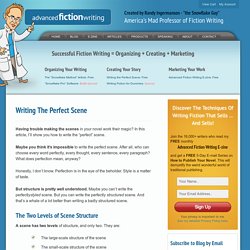
In this article, I’ll show you how to write the “perfect” scene. Maybe you think it’s impossible to write the perfect scene. After all, who can choose every word perfectly, every thought, every sentence, every paragraph? What does perfection mean, anyway? Honestly, I don’t know. But structure is pretty well understood. Settings in Your Novel That Work As Triggers. When choosing settings for your scenes, you want to think about the kinds of places that will allow the emotions, needs, dreams, and fears of your characters to come out.

Certain places will trigger these things to come to the surface and will stir memories. Your character has a past, and even if she never visits any of the places in her past in your novel, other places can draw out feelings and memories. This happens to us all the time. Of course, if you are putting your characters in places they’ve been before, or they are living in the same town their whole life, those memories and feelings are closer to the surface.
The point it, you want to use your setting to help bring out your themes, drive your plot, and reveal character. In last week’s post I had you think about the places in your past that evoked special memories or feelings. Al's Writing Block: Writing: How to Describe a Room. I've noticed lately in the stats that people have been actively searching for "how to describe a room.
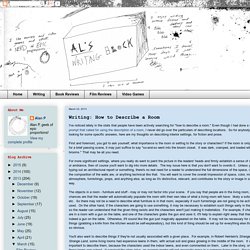
" Even though I had done a writing prompt that called for using the description of a room, I never did go over the particulars of describing locations. So for anybody looking for some specific answers, here are my thoughts on describing interior settings, for fiction and prose. First and foremost, you got to ask yourself, what importance is the room or setting to the story or characters? A character map.doc.
ESL English Lesson using Basic Interview Questions. Creative Writing Prompts. Write a scene that includes a character speaking a different language, speaking in a thick accent, or otherwise speaking in a way that is unintelligibe to the other characters.

(Note: You don't necessarily need to know the language the character is speaking—be creative with it!) Describe a character's reaction to something without explaining what it is. See if your fellow prompt responders can guess what it is. Write a story or a scene about one character playing a prank on another. Describe the scene from both characters' points of view. Writing Prompt: Write a story that involves confusion over homonyms (words that have the same spelling but different meanings) or homophones (words that sound the same but are spelled differently).
For World Storytelling Day, share the best story you've ever heard or told by word of mouth, or have a fictional character recount their favorite story. Your Favorites: 100 Best-Ever Teen Novels. It's almost a cliche at this point to say that teen fiction isn't just for teens anymore.
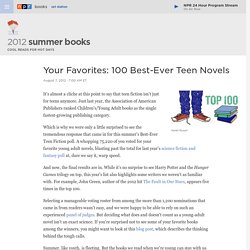
Just last year, the Association of American Publishers ranked Children's/Young Adult books as the single fastest-growing publishing category. Aliens & Faeries: Non-Human Characters Acting Badly. Aliens and Faeries: Non-Human Characters Acting Badly by Lee Masterson Most writers of speculative fiction have a tendency to include a non-human character or two in their novels these days.
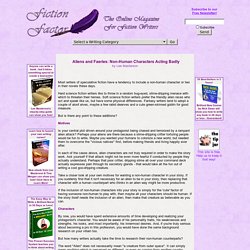
Hard science fiction writers like to throw in a random bug-eyed, slime-dripping menace with which to threaten their heroes. Soft science fiction writers prefer the friendly alien races who act and speak like us, but have some physical differences. Stephen King's Top 20 Rules for Writers. Image by the USO, via Flickr Commons In one of my favorite Stephen King interviews, for The Atlantic, he talks at length about the vital importance of a good opening line.

“There are all sorts of theories,” he says, “it’s a tricky thing.” “But there’s one thing” he’s sure about: “An opening line should invite the reader to begin the story. It should say: Listen. Come in here. We’ve talked so much about the reader, but you can’t forget that the opening line is important to the writer, too. This is excellent advice. Revision in the second draft, “one of them, anyway,” may “necessitate some big changes” says King in his 2000 memoir slash writing guide On Writing. Brainstorming. Free News, Magazines, Newspapers, Journals, Reference Articles and Classic Books - Free Online Library. The 10 Types of Writers' Block (and How to Overcome Them) Creative Writing. These OWL resources will help you with the basics of creative writing. This section includes resources on writing poetry, fiction, and creative nonfiction. Fiction Writing Basics This resource discusses some terms and techniques that are useful to the beginning and intermediate fiction writer, and to instructors who are teaching fiction at these levels.
The distinction between beginning and intermediate writing is provided for both students and instructors, and numerous sources are listed for more information about fiction tools and how to use them. 60 Awesome Search Engines for Serious Writers. June 20th, 2010 Finding the information you need as a writer shouldn’t be a chore. Luckily, there are plenty of search engines out there that are designed to help you at any stage of the process, from coming up with great ideas to finding a publisher to get your work into print.
Both writers still in college and those on their way to professional success will appreciate this list of useful search applications that are great from making writing a little easier and more efficient. Professional Find other writers, publishers and ways to market your work through these searchable databases and search engines. How to Write a Book In Your Spare Time. Many people say they would like to write a book. That statement is usually in the form of “I have this great book idea”, “I’ve always wanted to write a novel” or “I will write it when I have more time.” I used to say things like that. Organize your writing, J.K. Rowling style. The website /Film reported on Friday about author J.K.
Rowling’s method for organizing her books. Using pen, notebook paper, and a simple grid, she plotted out the direction of her stories. Pictured here is the chart for chapters 13-24 of Harry Potter and the Order of the Phoenix: (Note: /Film includes a larger version on their site for detailed reading.) The grid outlines the chapter, month, chapter title, explanation of how that chapter relates to the over-arching plot of the book, and then columns for each of the book’s six subplots (prophecies, Harry’s romantic interests, Dumbledore’s Army, Order of the Phoenix, Snape and crew, and Hagrid and Grawp). Learn from the Greats: 7 Writing Habits of Amazing Writers. What you can learn from great writers By Leo Babauta. How to write your book's first draft like a professional.
Advice to Writers - Writing Is A Voyage of Discovery. 19 Writing Tips From Writers And Editors For The New Yorker. How to Finish What You Start: A Five-Step Plan for Writers. Top 10 self-publishing tips. Creative Writing Forums - Writing Help, Writing Workshops, & Writing Community. Imagery or Sensory Words. Plotting Made Simple. Plotting. 10 Things Shakespeare Can Teach Us About Writing Thrillers. Conspiracy. 10 Dos & Don'ts For the Aspiring Novelist. Two months ago my first novel hit the bookstores. How to Break the Rules of Writing (& More) According to Bestselling YA author Ransom Riggs. Like most first conversations and bad first drafts, my (WD’s Managing Editor Adrienne Crezo) interview with Ransom Riggs begins with a discussion about the weather.
And not just any weather, either, but peculiar versions of standard precipitation: dust storms, cloudbursts, thundersnow and tornadoes. Of course, Riggs is experiencing none of those phenomena as he sits in the warmth of the never-ending summer of Los Angeles. “I hate to tell you what it’s like here right now,” he says. 102 Resources For Fiction Writing. UPDATE 1/10: Dead links removed, new links added, as well as Revision and Tools and Software sections. 73 Ways to Become a Better Writer. Ten rules for writing fiction. Msgyuhba6q1sr9i3ho1_500.jpg (500×669) 6 Ways to Write Better Bad Guys. 10 Secrets to Creating Unforgettable Supporting Characters. Writing Characters Using Conflict & Backstory. How to Make Readers Feel Emotion. Writing Fiction: How to Structure a Killer Novel Ending. How a Scene List Can Change Your Novel-Writing Life. How to Plot a Novel With Index Cards.
How to Write a Synopsis of Your Novel. How to Structure A Story: The Eight-Point Arc. How to Write Gothic Fiction: 13 steps. How to Write a Gothic Novel. Lady Dae Writes: So You Want to Write a Gothic Novel. How to Write a Gothic Tale. Elements of the Gothic Novel. How to write a book - Now Novel. The Gothic Novel: What is Gothic Literature? Writing a Novel – What You Need To Know. 7 Tiny Things You Can Do In A Few Minutes For Your Writing Creativity. 365 Pictures Daily Photo Prompts Generated for Your Creative Inspiration! A concise guide to important grammar, punctuation, and writing style rules. 10 Writing Rules You Can't Break...And How to Break Them. A Simple Novel Outline – 9 questions for 25 chapters « H.E. Roulo. The Write Practice — The Online Writing Workbook. Children's Writing. Writing Aid. 50 of the Best Websites for Writers.
Writerswrite.co. Exercises for Fiction Writers - Page 2. Magical World Builder. Creating Fantasy Nations (World Building II) Magical World Builder. Top 10 Underrated Fantasy Stories Before 1937. 1001 Books You Must Read Before You Die. BookRags.com Book Summaries, Study Guides. Free ebooks - Project Gutenberg. Games - Games to Learn English – For Students.
Grammar. 60 Awesome Search Engines for Serious Writers. Creative Writing Exercises - set your imagination free. Your Writing Journal - Journal Ideas and Tips on How to Write a Journal. VocabGrabber. Character Archetypes. What Jane Eyre Can Teach You About Mind-Blowing Heroines. Different hairstyles and descriptive words for hair. 7 Keys To Write the Perfect First Line of a Novel. Character Archetypes. 3 Ways to Develop a Character for a Story. How to Detect Lies - body language, reactions, speech patterns. Random Plot Generator.
Tools for Writing: Points of View in Writing. Character Development. Situational Irony: Definition & Examples. Godchecker.com - Your Guide To The Gods. Major Gods. Lester Dent Pulp Paper Master Fiction Plot. How to Write a Credible Fantasy Story (with Examples) 25 Insights on Becoming a Better Writer. 13 Browser-Based Tools For Writers. Shady Characters. Story Starters, Creative Writing Ideas for Fiction. Dictionary.com - Free Online English Dictionary.